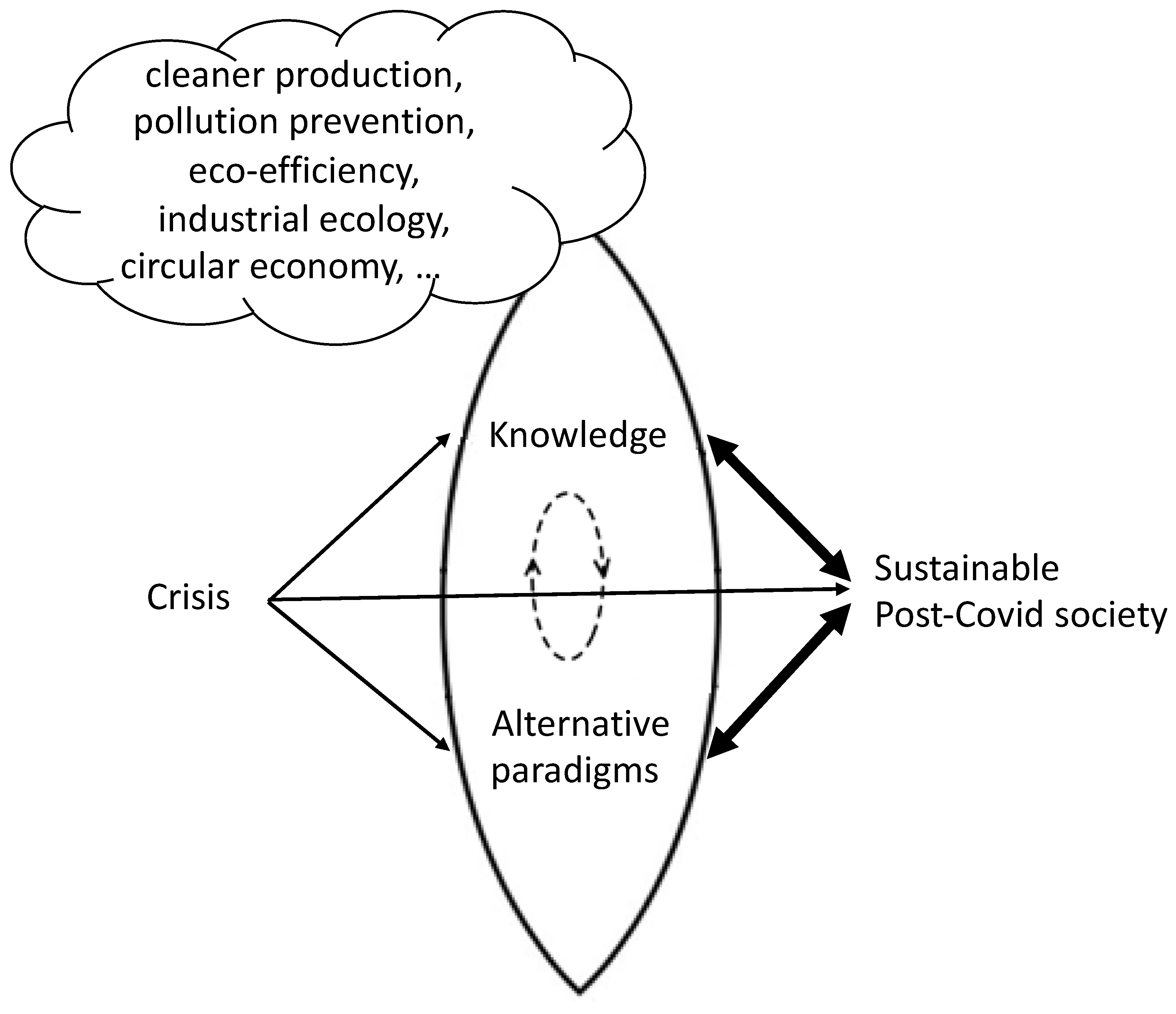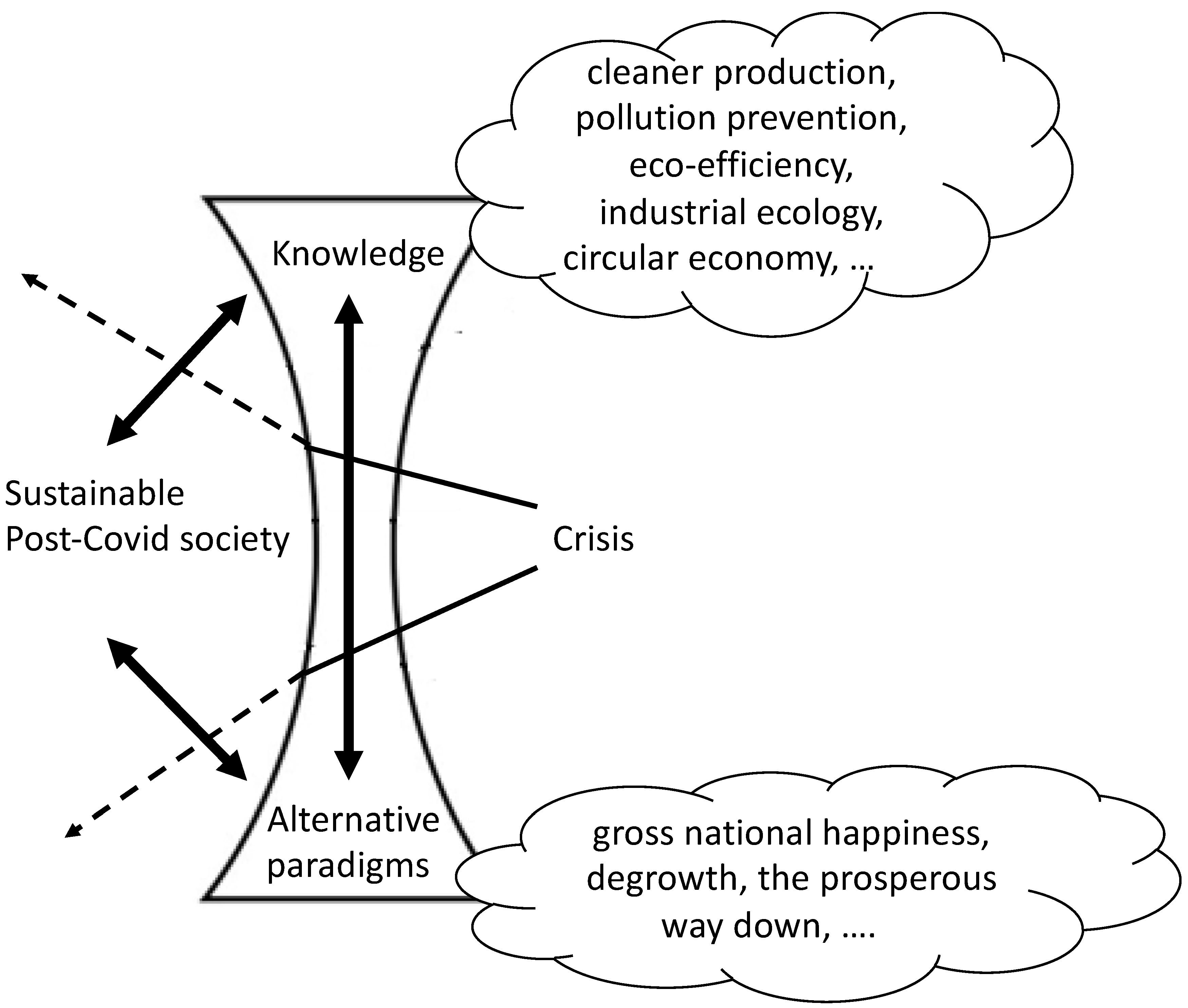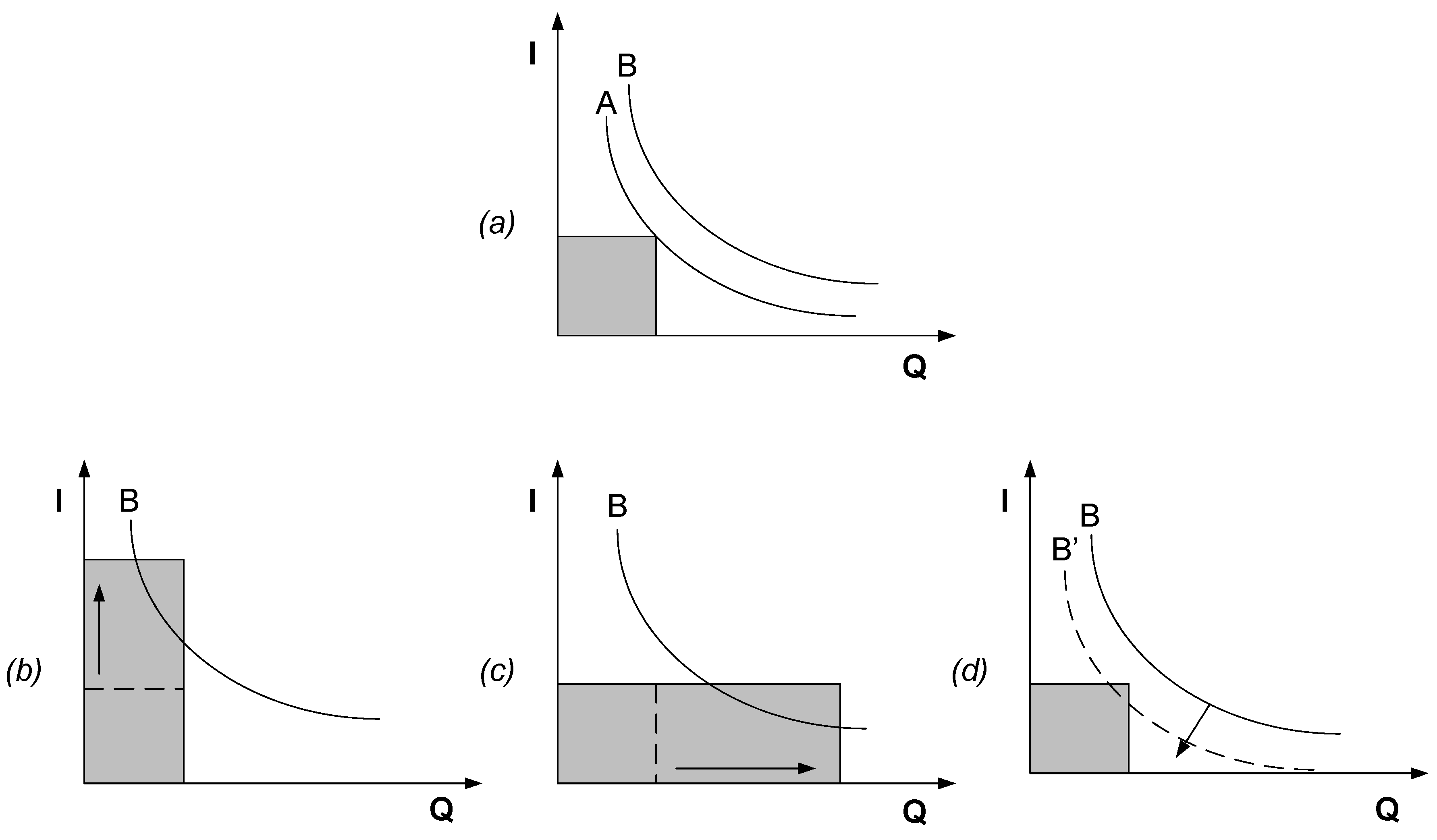What Are the Stimuli to Change to a Sustainable Post-COVID-19 Society?
Abstract
:1. Introduction
2. Three Stimuli to the Change towards Sustainable Post-COVID-19 Societies
2.1. The Role of Crisis
2.2. The Role of Accumulated Knowledge
2.3. The Role of Alternative Paradigms
3. The Potential of Stimuli in Affecting the Earth Carrying Capacity
4. Concluding Remarks
Author Contributions
Funding
Institutional Review Board Statement
Informed Consent Statement
Data Availability Statement
Conflicts of Interest
References
- Gonella, F.; Almeida, C.M.V.B.; Fiorentino, G.; Testoni, R.; Zucaro, A. Is technology optimism justified? A discussion towards a comprehensive narrative. J. Clean. Prod. 2019, 223, 456–465. [Google Scholar] [CrossRef]
- Thrupp, L.A. Legitimizing local knowledge: From displacement to empowerment for Third World people. Agric. Hum. Values 1989, 6, 13–24. [Google Scholar] [CrossRef]
- Martinez-Alier, J.; O’Connor, M. Distributional Issues: An Overview. In Handbook of Environmental and Resource Economics; van der Bergh, J., Ed.; Edward Elgar: Cheltenham, UK; Brookfield, VT, USA, 1999. [Google Scholar]
- Redclift, M.R. Sustainable Development: Exploring the Contradictions; Methuen: London, UK, 1987. [Google Scholar]
- Escobar, A. Imaging the post-development era: Critical thought, development, and social movements. Soc. Text. 1992, 10, 20–56. [Google Scholar] [CrossRef]
- Sachs, W. (Ed.) Global Ecology. In The Development Dictionary; A Guide to Knowledge as Power; Zed: London, UK, 1992. [Google Scholar]
- Stockholm Declaration of the Human Environment, Report of the United Nations Conference on the Human Environment, UNEPOR, June 16, 1972, UN.Doc.A/CONF.48/14/Rev.1, 1973) Principle 1 and 2. Available online: https://digitallibrary.un.org/record/523249 (accessed on 17 November 2021).
- Rio Declaration on Environment and Development, Report of the United Nations Conference on Environment and Development, UN Doc. A/CONF.151/26/Rev. 1 (1992), Principle 3. Available online: https://www.un.org/en/development/desa/population/migration/generalassembly/docs/globalcompact/A_CONF.151_26_Vol.I_Declaration.pdf (accessed on 17 November 2021).
- UNESCO. Declaration on the Responsibilities of the Present Generations towards Future Generations. In Proceedings of the 29th the General Conference of UNESCO, Paris, France, 12 November 1997. [Google Scholar]
- Weiss, E.B. ln Fairness to Future Generations: International Law, Common Patrimony, and Intergenerational Equity, The United Nations University; Transnational Publishers: New York, NY, USA, 1989. [Google Scholar]
- Odum, H.T. Environmental Accounting: Emergy and Environmental Decision Making; John Wiley & Sons: New York, NY, USA, 1996. [Google Scholar]
- Odum, H.T.; Odum, E. The prosperous way down. Energy 2006, 31, 21–32. [Google Scholar] [CrossRef]
- Wackernagel, M.; Hanscom, L.; Lin, D. Making the Sustainable Development Goals Consistent with Sustainability. Frontiers in Energy Research. 2017. Available online: https://www.frontiersin.org/article/10.3389/fenrg.2017.00018 (accessed on 23 August 2021).
- Wackernagel, M.; Rees, W.E. Our Ecological Footprint: Reducing Human Impact on the Earth. Gabriola Island; New Society Publishers: Gabriola Island, BC, Canada, 1996. [Google Scholar]
- Hornsey, M.J.; Fielding, K.S.; McStay, R.; Reser, J.P.; Bradley, G.L.; Greenaway, K.H. Evidence for motivated control: Understanding the paradoxical link between threat and efficacy beliefs about climate change. J. Environ. Psychol. 2015, 42, 57–65. [Google Scholar] [CrossRef]
- Rocheleau, D.E.; Steinberg, P.E.; Benjamin, P.A. Environment, development, crisis, and crusade: Ukambani, Kenya, 1890–1990. World Dev. 1995, 23, 1037–1051. [Google Scholar] [CrossRef]
- Millennium Ecosystem Assessment. Ecosystems and Human Well-Being: Synthesis; Island Press: Washington, DC, USA, 2005. [Google Scholar]
- Millennium Ecosystem Assessment. Ecosystems and Human Well-Being: Current State and Trends; Island Press: Washington, DC, USA, 2005. [Google Scholar]
- Millennium Ecosystem Assessment. Ecosystems and Human Well-Being: Scenarios; Island Press: Washington, DC, USA, 2005. [Google Scholar]
- Piketty, T. Capital in the Twenty-First Century; Harvard University Press: Cambridge, MA, USA, 2014. [Google Scholar]
- Steffen, W.; Grinevald, J.; Crutzen, P.; McNeill, J. The Anthropocene: Conceptual and historical perspectives. Phil. Trans. R. Soc. A 2011, 369, 842–867. [Google Scholar] [CrossRef]
- Laurent, E. Issues in environmental justice within the European Union. Ecol. Econ. 2011, 70, 1846–1853. [Google Scholar] [CrossRef]
- Martinez-Alier, J. The Environmentalismof the Poor: A Study of Ecological Conflicts and Valuation; Edward Elgar Publishing: Cheltenham, UK, 2002. [Google Scholar]
- Berthe, A.; Elie, L. Mechanisms explaining the impact of economic inequality on environmental deterioration. Ecol. Econ. 2015, 116, 191–200. [Google Scholar] [CrossRef]
- Duflot, R.; Baumeister, S.; Burgas, D.; Kuparinen, A.; Potterf, M. Building up an ecologically sustainable and socially desirable post-COVID-19 future. Sustain. Sci. 2021, 16, 1397–1403. [Google Scholar] [CrossRef] [PubMed]
- Wilkinson, R.; Pickett, K. The Spirit Level: Why Equality is Better for Everyone; Penguin Books: London, UK, 2010. [Google Scholar]
- Heerink, N.; Mulatu, A.; Bulte, E. Income inequality and the environment: Aggregation bias in environmental Kuznets curves. Ecol. Econ. 2001, 38, 359–367. [Google Scholar] [CrossRef]
- Fleurbaey, M.; Kartha, S.; Bolwig, S.; Chee, Y.L.; Chen, Y.; Corbera, E.; Lecocq, F.; Lutz, W.; Muylaert, M.S.; Norgaard, R.B.; et al. (Eds.) Climate Change 2014: Mitigation of Climate Change. In Contribution of Working Group III to the Fifth Assessment Report of the Intergovernmental Panel on Climate Change; Cambridge University Press: Cambridge, UK; New York, NY, USA, 2014. [Google Scholar]
- Scruggs, L.A. Political and economic inequality and the environment. Ecol. Econ. 1998, 26, 259–275. [Google Scholar] [CrossRef]
- Roca, J. Do individual preferences explain the Environmental Kuznets curve? Ecol. Econ. 2003, 45, 3–10. [Google Scholar] [CrossRef]
- Roca, J.; Serrano, M. Income growth and atmospheric pollution in Spain: An input–output approach. Ecol. Econ. 2007, 63, 230–242. [Google Scholar] [CrossRef] [Green Version]
- Bina, O.; La Camera, L. Promise and shortcomings of a green turn in recent policy responses to the “double crisis”. Ecol. Econ. 2011, 70, 2308–2316. [Google Scholar] [CrossRef]
- IPCC. 2021. Available online: https://www.un.org/climatechange?gclid=Cj0KCQjwkIGKBhCxARIsAINMioKf4×0pSlvGn7rt_JzaxT0YAZLYmZzUPVHDbpopyg1GOgvdlqRzFiQaApnfEALw_wcB (accessed on 2 September 2021).
- IPCC. Summary for policymakers. In Climate Change 2013: The Physical Science Basis. Contribution of Working Group I to the Fifth Assessment Report of the Intergovernmental Panel on Climate Change; Stocker, T.F., Qin, D., Plattner, G.-K., Tignor, M., Allen, S.K., Boschung, J., Nauels, A., Xia, Y., Bex, V., Midgley, P.M., Eds.; Cambridge University Press: Cambridge, UK; New York, NY, USA, 2013. [Google Scholar]
- Mora, C.; Frazier, A.G.; Longman, R.J.; Dacks, R.S.; Walton, M.M.; Tong, E.J. The projected timing of climate departure from recent variability. Nature 2013, 502, 183–187. [Google Scholar] [CrossRef] [PubMed]
- Heath, Y.; Gifford, R. Free-market ideology and environmental degradation: The case of belief in global climate change. Environ. Behav. 2006, 38, 48–71. [Google Scholar] [CrossRef]
- Kellstedt, P.M.; Zahran, S.; Vedlitz, A. Personal efficacy, the information environment, and attitudes toward global warming and climate change in the United States. Risk Anal. 2008, 28, 113–126. [Google Scholar] [CrossRef]
- Milfont, T. The interplay between knowledge, perceived efficacy, and concern about global warming and climate change: A one-year longitudinal study. Risk Anal. 2012, 32, 1003–1020. [Google Scholar] [CrossRef]
- Boin, A.; Hart, P.; Stern, E.; Sundelius, B. The Politics of Crisis Management: Public Leadership Under Pressure; Cambridge University Press: Cambridge, UK; New York, NY, USA, 2005. [Google Scholar]
- Bouman, T.; Steg, L.; Dietz, T. Insights from early COVID-19 responses about promoting sustainable action. Nat. Sustain. 2021, 4, 194–200. [Google Scholar] [CrossRef]
- Lo, A.Y. Analysis and Democracy: The Antecedents of the Deliberative Approach of Ecosystems Valuation. Environ. Plan. C Gov. Policy 2011, 29, 958–974. [Google Scholar] [CrossRef] [Green Version]
- Stobbelaar, D.J.; Groot, J.C.J.; Bishop, C.; Hall, J.; Pretty, J. Internalization of agri-environmental policies and the role of institutions. J. Environ. Manag. 2009, 90 (Suppl. 2), S175–S184. [Google Scholar] [CrossRef]
- Lehmann, P.; Beck, S.; de Brito, M.M.; Strunz, S.; Thrän, D. Environmental sustainability post-covid-19: Scrutinizing popular hypotheses from a social science perspective. Sustainability 2021, 13, 8679. [Google Scholar] [CrossRef]
- Mi, L.; Zhao, J.; Xu, T.; Qiao, Y.; Zhang, Z. How does COVID-19 emergency cognition influence public pro-environmental behavioral intentions? An affective event perspective. Resour. Conserv. Recycl. 2021, 168, 105467. [Google Scholar] [CrossRef]
- DeMarco, P.M. Rachel Carson’s environmental ethic—A guide for global systems decision making. J. Clean. Prod. 2017, 140, 127–133. [Google Scholar] [CrossRef]
- Carson, R.; Darling, L.; Darling, L. Silent Spring; Houghton Mifflin Company & Riverside Press: Cambridge, MA, USA, 1962. [Google Scholar]
- Ehrlich, P.R. The Population Bomb; Ballantine Books: New York, NY, USA, 1968. [Google Scholar]
- Commoner, B. The relation between industrial and ecological systems. J. Clean. Prod. 1997, 5, 125–129. [Google Scholar] [CrossRef]
- Commoner, B. The environmental cost of economic growth. In Energy, Economic Growth, and The Environment; RFF Press: Washington, DC, USA, 2013; Volume 7, pp. 30–66. [Google Scholar]
- Meadows, D.H.; Meadows, D.L.; Randers, J.; Behrens, W.W., III. Limits to Growth; New American Library: New York, NY, USA, 1972. [Google Scholar]
- Meadows, D.H.; Randers, J.; Meadows, D.L. The Future of Nature: Documents of Global Change. Trans. R. Soc. S. Afr. 2013, 69, 101–112. [Google Scholar]
- Wilcox, B.A.; Gubler, D.J. Disease ecology and the global emergence of zoonotic pathogens. Environ. Health Prev. Med. 2005, 10, 263–272. [Google Scholar] [CrossRef]
- di Marco, M.; Baker, M.L.; Daszak, P. Opinion: Sustainable development must account for pandemic risk. Proc. Natl. Acad. Sci. USA 2010, 117, 3888–3892. [Google Scholar] [CrossRef] [Green Version]
- Keesing, F.; Belden, L.K.; Daszak, P. Impacts of biodiversity on the emergence and transmission of infectious diseases. Nature 2010, 468, 647–652. [Google Scholar] [CrossRef] [PubMed]
- Gedžūne, G.; Gedžūne, I. Pre-service teachers’ aesthetic learning about inclusion and exclusion. Int. J. Sustain. High. Educ. 2015, 16, 72–95. [Google Scholar] [CrossRef]
- Henning, G.K. The guided hike in Banff National Park: A hermeneutical performance. J. Sustain. Tour. 2008, 16, 182–196. [Google Scholar] [CrossRef]
- Hull, D.L.; Glenn, S.S. Multiply concurrent replication. Behav. Brain Sci. 2004, 27, 902–904. [Google Scholar] [CrossRef]
- Schönpflug, U.; Bilz, L. The Transmission Process: Mechanisms and Contexts. In Cultural Transmission: Psychological, Developmental, Social, and Methodological Aspects; Culture and Psychology; Schönpflug, U., Ed.; Cambridge University Press: Cambridge, UK, 2008; pp. 212–239. [Google Scholar]
- Graedel, T.E.; Allenby, B.R. Industrial Ecology; Prentice Hall: Upper Saddle River, NJ, USA, 1995. [Google Scholar]
- Ayres, R.U. Industrial Metabolism: Restructuring for Sustainable Development; Ayres, R.U., Simonis, U.K., Eds.; United Nations UP: Tokyo, Japan, 1994; pp. 3–20. [Google Scholar]
- Ayres, R.U. Industrial Metabolism: Theory and Policy. National Academy of Engineering. In The Greening of Industrial Ecosystems; The National Academies Press: Washington, DC, USA, 1994. [Google Scholar]
- Lemille, A.; Schröder, P.; Desmond, P. Making the circular economy work for human development. Resour. Conserv. Recycl. 2020, 156, 104686. [Google Scholar]
- Blomsma, F.; Brennan, G. The emergence of circular economy: A new framing around prolonging resource productivity. J. Ind. Ecol. 2017, 21, 603–614. [Google Scholar] [CrossRef]
- Brones, F.; Carvalho, M.M. From 50 to 1: Integrating literature toward a systemic ecodesign model. J. Clean. Prod. 2015, 96, 44–57. [Google Scholar] [CrossRef]
- Otero, I.; Farrell, K.N.; Pueyo, S. Biodiversity policy beyond economic growth. Conserv. Lett. 2020, 13, e12713. [Google Scholar] [CrossRef] [Green Version]
- Jevons, W.S. The Coal Question: An Inquiry Concerning the Progress of the Nation, and the Probable Exhaustion of Our Coal-Mines; Flux, A.W., Ed.; A.M. Kelley: New York, NY, USA, 1965. [Google Scholar]
- Ceddia, M.G.; Sedlacek SBardsley, N.O.; Gomez-y-Paloma, S. Sustainable agricultural intensification or Jevons paradox? Role Public Gov. Trop. S. Am. Glob. Environ. Chang. 2013, 23, 1052–1063. [Google Scholar] [CrossRef]
- Velten, S.; Leventon, J.; Jager, N.; Newig, J. What is sustainable agriculture? A systematic review. Sustainability 2015, 7, 7833–7865. [Google Scholar] [CrossRef] [Green Version]
- Nuss, P.; Günther, J.; Kosmol, J.; Müller, F.; Frerk, M. Monitoring framework for the use of natural resources in Germany. Resour. Conserv. Recycl. 2021, 175, 105858. [Google Scholar] [CrossRef]
- York, R. Ecological Paradoxes: William Stanley Jevons and the Paperless Office. Hum. Ecol. Rev. 2006, 13, 143–147. [Google Scholar]
- Alcott, B. Jevons’ paradox. Ecol. Econ. 2005, 54, 9–21. [Google Scholar] [CrossRef]
- Blatt, E.F.; Giannetti, B.F.; Agostinho, F.; Sevegnani, S.; Wang, Y.; Almeida, C. MVB Evaluating producers as resource consumers and alternative consumption patterns: Outcomes from emergy synthesis of the jeans supply chain. Clean. Responsible Consum. 2020, 1, 100002. [Google Scholar] [CrossRef]
- Kuhn, T.S. The Structure of Scientific Revolutions, 1st ed.; University of Chicago Press: Chicago, IL, USA, 1962. [Google Scholar]
- Frugoli, P.A.; Almeida, C.M.V.B.; Agostinho, F.; Giannetti, B.F.; Huisingh, D. Can measures of wellbeing and progress help societies to achieve sustainable development? J. Clean. Prod. 2015, 90, 370–380. [Google Scholar] [CrossRef]
- Giannetti, B.F.; Agostinho, F.; Almeida, C.M.V.B.; Huisingh, D. A review of limitations of GDP and alternative indices to monitor human wellbeing and to manage ecosystem functionality. J. Clean. Prod. 2015, 87, 11–25. [Google Scholar] [CrossRef]
- Giannetti, B.F.; Fonseca, T.; Almeida, C.M.V.B.; Oliveira, J.H.; Valenti, W.C.; Agostinho, F. Beyond a Sustainable Consumption Behavior: What Post-pandemic World Do We Want to Live in? Front. Sustain. 2021, 2, 635761. [Google Scholar] [CrossRef]
- van den Bergh, J.C.J.M. Six policy perspectives on the future of a semi-circular economy. Resour. Conserv. Recycl. 2020, 160, 104898. [Google Scholar] [CrossRef]
- Ura, K.; Galay, K. (Eds.) Gross National Happiness and Development. In First International Seminar on Operationalization of Gross National Happiness; The Centre for Bhutan Studies: Thimphu, Bhutan, 2004. [Google Scholar]
- Daly, H. A further critique on growth economics. Ecol. Econ. 2013, 88, 20–24. [Google Scholar] [CrossRef]
- Daly, H. A Steady-State Economy. UK Sustainable Development Commission. 2008. Available online: http://www.sd-commission.org.uk/publications.php?id=775 (accessed on 12 September 2015).
- Robèrt, K.-H. Tools and concepts for sustainable development, how do they relate to a framework for sustainable development, and to each other? J. Clean. Prod. 2000, 8, 243–254. [Google Scholar] [CrossRef]
- United Nations Environment Programme (UNEP, 2015). Available online: http://www.unep.org/greeneconomy/AboutGEI/WhatisGEI/tabid/29784/Default.aspx (accessed on 12 August 2021).
- Giannetti, B.F.; Almeida, C.M.V.B.; Agostinho, F.; Sulis, F.; Coscieme, L.; Pulselli, F.M.; Bastianoni, S.; Marchettini, N. Enzo Tiezzi, turning pioneering into modern ideas: Tempos, Ecodynamics and sustainable economy. Ecol. Model. 2020, 431, 109162. [Google Scholar]
- Geng, Y.; Sarkis, J.; Ulgiati, S.; Zhang, P. Measuring China’s Circular Economy. Science 2013, 339, 1526–1527. [Google Scholar] [CrossRef]
- Ghisellini, P.; Gaetano, P.; Viglia, S.; Gaworski, M.; Setti, M.; Ulgiati, S. Integrated Agricultural and Dairy Production within a Circular Economy Framework. A Comparison of Italian and Polish Farming Systems. J. Environ. Account. Manag. 2014, 2, 367–384. [Google Scholar] [CrossRef]
- Mellino, S.; Gaetano, P.; Buonocore, E.; Angelis, G.; Liu, G.; Xu, L.; Ulgiati, S. Alternative Options for Sewage Sludge Treatment and Process Improvement Through Circular Patterns: LCA-based Case Study and Scenarios. J. Environ. Account. Manag. 2015, 3, 77–85. [Google Scholar] [CrossRef] [Green Version]
- Baggio, G.; Qadir, M.; Smakhtin, V. Freshwater availability status across countries for human and ecosystem needs. Sci. Total Environ. 2021, 792, 148230. [Google Scholar] [CrossRef]
- Von Liebig, J. Die Grundsätze der Agricultur-Chemie: Mit Rücksicht auf Die in England Angestellten Untersuchungen; F. Vieweg und Sohn: Braunschweig, Germany, 1855. [Google Scholar]
- Giannetti, B.F.; Demétrio, J.F.C.; Bonilla, S.H.; Agostinho, F.; Almeida, C.M.V.B. Emergy diagnosis and reflections towards Brazilian sustainable development. Energy Policy 2013, 63, 1002–1012. [Google Scholar] [CrossRef]
- Wilting, H.C.; Schipper, A.M.; Bakkenes, M.; Meijer, J.R.; Huijbregts, M.A.J. Quantifying Biodiversity Losses Due to Human Consumption: A Global-Scale Footprint Analysis. Environ. Sci. Technol. 2017, 51, 3298–3306. [Google Scholar] [CrossRef]
- Isbell, F.; Tilman, D.; Polasky, S.; Loreau, M. The biodiversity-dependent ecosystem service debt. Ecol. Lett. 2015, 18, 119–134. [Google Scholar] [CrossRef] [PubMed]
- Ascher, W. Coping with complexity and organizational interests in natural resource management. Ecosystems 2001, 4, 742–757. [Google Scholar] [CrossRef]
- Fearnside, P.M. Estimation of human carrying capacity in rainforest áreas. Trends Ecol. Evol. 1990, 5, 192–196. [Google Scholar] [CrossRef]





| Mental Model | Theory | Main Ideas |
|---|---|---|
| Social | Gross National Happiness | The GNH is a conceptual, philosophical, and political framework designed to measure the population’s general level of wellbeing [78]. The four pillars of GNH are proper governance, promoting SD, conservation of the natural environment, and preserving cultural values. |
| Environmental | The prosperous way down | Progress, wellbeing, and happiness should adapt, respecting the Planet’s capacity in providing resources and environmental services [11,12]. |
| Economic | Degrowth | Refers to an equitable downscaling of consumption and production assuring human wellbeing and ecological conditions [79,80]. |
Publisher’s Note: MDPI stays neutral with regard to jurisdictional claims in published maps and institutional affiliations. |
© 2021 by the authors. Licensee MDPI, Basel, Switzerland. This article is an open access article distributed under the terms and conditions of the Creative Commons Attribution (CC BY) license (https://creativecommons.org/licenses/by/4.0/).
Share and Cite
Almeida, C.M.V.B.; Giannetti, B.F.; Agostinho, F.; Liu, G.; Yang, Z. What Are the Stimuli to Change to a Sustainable Post-COVID-19 Society? Sustainability 2021, 13, 12939. https://doi.org/10.3390/su132312939
Almeida CMVB, Giannetti BF, Agostinho F, Liu G, Yang Z. What Are the Stimuli to Change to a Sustainable Post-COVID-19 Society? Sustainability. 2021; 13(23):12939. https://doi.org/10.3390/su132312939
Chicago/Turabian StyleAlmeida, Cecilia M. V. B., Biagio F. Giannetti, Feni Agostinho, Gengyuan Liu, and Zhifeng Yang. 2021. "What Are the Stimuli to Change to a Sustainable Post-COVID-19 Society?" Sustainability 13, no. 23: 12939. https://doi.org/10.3390/su132312939








